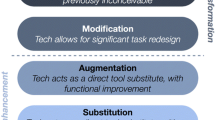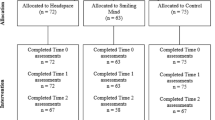Abstract
Mobile applications (apps) to improve health are proliferating, but before healthcare providers or organizations can recommend an app to the patients they serve, they need to be confident the app will be user-friendly and helpful for the target disease or behavior. This paper summarizes seven strategies for evaluating and selecting health-related apps: (1) Review the scientific literature, (2) Search app clearinghouse websites, (3) Search app stores, (4) Review app descriptions, user ratings, and reviews, (5) Conduct a social media query within professional and, if available, patient networks, (6) Pilot the apps, and (7) Elicit feedback from patients. The paper concludes with an illustrative case example. Because of the enormous range of quality among apps, strategies for evaluating them will be necessary for adoption to occur in a way that aligns with core values in healthcare, such as the Hippocratic principles of nonmaleficence and beneficence.
Similar content being viewed by others
References
Nilsen W, Kumar S, Shar A, et al. Advancing the science of mHealth. J Health Commun. 2012;17(Suppl 1):5-10.
Fox S, Duggan M. Mobile Health 2012. Washington, DC: Pew Research Center's Internet and American Life Project; 2012.
Leroux E, Rivas H. Mobile health without borders, evidence-based mHealth. Stanford University; 2014.
West DM. How mobile devices are transforming healthcare issues in technology innovation. Issues Technol Innov. 2012;18:1-14.
Wang A, An N, Lu X, Chen H, Li C, Levkoff S. A classification scheme for analyzing mobile apps used to prevent and manage disease in late life. JMIR MHealth UHealth. 2014;2(1):e6.
Powell AC, Landman AB, Bates DW. In search of a few good apps. JAMA. Published online March 24, 2014.
Wolf JA, Moreau JF, Akilov O, et al. Diagnostic inaccuracy of smartphone applications for melanoma detection. JAMA Dermatol. 2013;149:422-426.
Gold A. Physicians split on use of mHealth apps FierceMobileHealthcare. 2014.
U.S. Food and Drug Administration. FDA issues final guidance on mobile medical apps, 2013. http://www.fda.gov/downloads/MedicalDevices/…/UCM263366.pdf. Accessed 19 August 2014.
Pagoto S, Schneider K, Jojic M, DeBiasse M, Mann D. Evidence-based strategies in weight-loss mobile apps. Am J Prev Med. 2013;45:576-582. mHealth Eval 2014.enl Page 2.
Breton ER, Fuemmeler BF, Abroms LC. Weight loss—there is an app for that! But does it adhere to evidence-informed practices? Trans Behav Med: Pract Policy Res. 2011;1(4):523-529.
Azar KMJ, Lesser LI, Laing BY, et al. Mobile applications for weight management: theory-based content analysis. Am J Prev Med. 2013;45:583-589.
Bender JL, Yue RY, To MJ, Deacken L, Jadad AR. A lot of action, but not in the right direction: systematic review and content analysis of smartphone applications for the prevention, detection, and management of cancer. J Med Internet Res. 2013;15:e287.
Donker T, Petrie K, Proudfoot J, Clarke J, Birch MR, Christensen H. Smartphones for smarter delivery of mental health programs: a systematic review. J Med Internet Res. 2013;15:e247.
Bailey SC, Belter LT, Pandit AU, Carpenter DM, Carlos E, Wolf MS. The availability, functionality, and quality of mobile applications supporting medication self-management. J Am Med Inform Assoc. 2014;21(3):542-546.
Martinez-Perez B, de la Torre-Diez I, Lopez-Coronado M. Mobile health applications for the most prevalent conditions by the World Health Organization: review and analysis. J Med Internet Res. 2013;15:e120.
El-Gayar O, Timsina P, Nawar N, Eid W. Mobile applications for diabetes self-management: status and potential. J Diabetes Sci Technol. 2013;7:247-262.
Muessig KE, Pike EC, Legrand S, Hightow-Weidman LB. Mobile phone applications for the care and prevention of HIV and other sexually transmitted diseases: a review. J Med Internet Res. 2013;15:e1.
van Mechelen DM, van Mechelen W, Verhagen EA. Sports injury prevention in your pocket?! Prevention apps assessed against the available scientific evidence: a review. Br J Sports Med. 2014;48(11):878-882.
Abroms LC, Padmanabhan N, Thaweethai L, Phillips T. iPhone apps for smoking cessation: content analysis. Am J Prev Med. 2011;40(3):279-285.
Dolan B. Happtique suspends mobile health app certification program. Mobihealthnews. 2013.
Cohn AM, Hunter-Reel D, Hagman BT, Mitchell J. Promoting behavior change from alcohol use through mobile technology: the future of ecological momentary assessment. Alcohol Clin Exp Res. 2011;35:2209-2215.
McGowan BS, Wasko M, Vartabedian BS, Miller RS, Freiherr DD, Abdolrasulnia M. Understanding the factors that influence the adoption and meaningful use of social media by physicians to share medical information. J Med Internet Res. 2012;14:e117.
O'Connor ME. 100 healthcare and digital health influencers to follow in 2014. http://www.slideshare.net/ennoconn/health-care-social-media-influencers. Accessed 26 August 2014.
Bastien JMC. Usability testing: a review of some methodological and technical aspects of the method. Int J Med Inform. 2010;79(4):e18-e23. doi:10.1016/j.ijmedinf.2008.12.004. Epub 2009 Apr 2.
Boudreaux ED, Haskins B. Evaluation of websites and web-based applications targeting alcohol and drug use. Poster to be presented at the 35th Annual Meeting and Scientific Session of the Society of Behavioral Medicine. Philadelphia, PA; 2014.
United States Food and Drug Administration. http://www.fda.gov/MedicalDevices/ProductsandMedicalProcedures/ConnectedHealth/MobileMedicalApplications/ucm255978.htm. Accessed 26 August 2014.
Acknowledgments
The authors would like to thank Brianna Haskins, MS, for her editorial assistance.
Financial disclosure
Boudreaux: Dr. Boudreaux owns stock in and receives consulting fees from Polaris Health Directions, a small business that produces software for clinical outcomes management. They do not produce mobile health apps.
Waring: Dr. Waring is supported by National Institutes of Health grants KL2TR000160 and 1U01HL105268. She has no other financial disclosures.
Hayes: Declares that she has no conflict of interest.
Sadasivam: Dr. Sadasivam is supported by National Institutes of Health, National Cancer Institute Career Development Award (K07CA172677). He has no other financial disclosures.
Mullen: Declares that he has no conflict of interest.
Pagoto: Dr. Pagoto is on the advisory board for Empower Fitness®, has consulted for Apple®, and receives funds to produce social media content for Sears® Fitstudio.
Author information
Authors and Affiliations
Corresponding author
Additional information
Implications
Researchers: Prior to designing and testing new mobile health (mHealth) applications (apps), researchers should systematically evaluate the apps that already exist in their target domain.
Practitioners: mHealth holds tremendous potential for improving patient health; however, healthcare providers and healthcare organizations will need to standardize their identification, evaluation, and selection of health related apps to maximize their utility, safety, and impact.
Policymakers: Policymakers and influential healthcare organizations should consider evaluating and vetting health related apps using standardized evaluation criteria, such as those used by the UK’s National Health Service (http://apps.nhs.uk).
About this article
Cite this article
Boudreaux, E.D., Waring, M.E., Hayes, R.B. et al. Evaluating and selecting mobile health apps: strategies for healthcare providers and healthcare organizations. Behav. Med. Pract. Policy Res. 4, 363–371 (2014). https://doi.org/10.1007/s13142-014-0293-9
Published:
Issue Date:
DOI: https://doi.org/10.1007/s13142-014-0293-9




